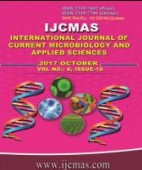


 National Academy of Agricultural Sciences (NAAS)
National Academy of Agricultural Sciences (NAAS)

|
PRINT ISSN : 2319-7692
Online ISSN : 2319-7706 Issues : 12 per year Publisher : Excellent Publishers Email : editorijcmas@gmail.com / submit@ijcmas.com Editor-in-chief: Dr.M.Prakash Index Copernicus ICV 2018: 95.39 NAAS RATING 2020: 5.38 |
Sclerotinia sclerotiorum appears to be among the most nonspecific, omnivorous and successful plant pathogen. The broad host range itself makes control of disease in agricultural crops very difficult, because it restricts the number of non-host crops that can be included in crop rotations. It plays a critical role in reducing the yield in economically important crop like oilseed Brassica. The management of this pathogen is very challenging due to persistence of sclerotia in the soil. Here, we approached diversified management practices with using different amendments for their comparative efficacy. Sclerotinia rot of mustard can be managed by seed treatment (@ 2 g/kg) and foliar spray (@ 0.2%) with Carbendazim resulted in maximum reduction in infection (88%) with increased pooled mean seed yield (2439kg/ha). The mixed formulation of mustard cake with micronutrients (Zn and B) was resulted in the reduction in disease infection ranged from 57.4% to 61.3%. Bio-control agents like Trichoderma, Bacillus subtilis and Pseudomonas fluorescens showed a medium level of disease reduction ranging from 51.3% to 64.3%.Seed treatment (@6g/kg) and foliar application (@0.6%) of Trichoderma showed a reduction of 51.3% disease incidence with yield (2095 kg/ha). An individual application of micronutrient was observed with average performance (<50%) in controlling the Sclerotinia stem rot. Overall the combination of bio-control agents with suitable chemical application might be better way for eco-friendly management of Sclerotinia rot.The present study will provide an idea for managing the fungus in the field conditions with the combination of chemical as well as biological methods for obtaining the optimum yield with minimum losses.
 |
 |
 |
 |
 |